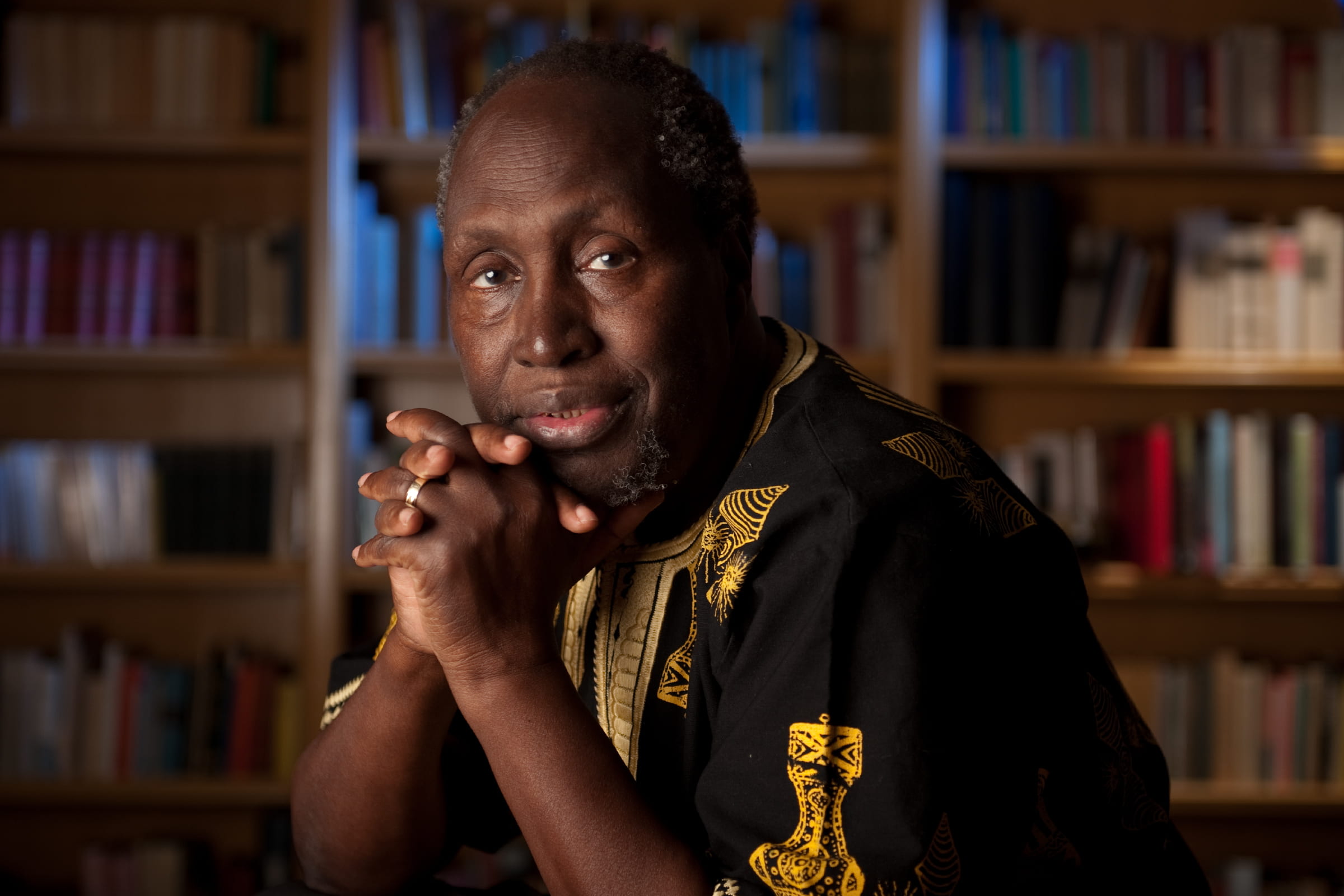For prolific African author, the stories never end

His name is pronounced “Googy,” and in his native African tongue, it means “work.” It’s fitting, because prolific author Ngugi wa Thiong’o has worked hard his entire life, turning out books, plays and newspaper columns that have made his unusual name known the world over.
Now in his 70s, Ngugi could be forgiven for slowing down the pace of his productivity — but he hasn’t. Instead, the Distinguished Professor of English and comparative literature at UC Irvine has written some of his best novels in the past five years, including the highly praised Wizard of the Crow. And still the work continues.
“No one can say, ‘I’ve now mastered the art of writing.’ There’s no moment of arrival. You finish your novel and start again,” Ngugi says. “Only through death do you stop — when there’s no more movement. But as long as you’re alive, there’s a constant striving to create something more meaningful.”
He’s driven to write, he says, because he has yet to produce the kind of novel he dreams about, his greatest testament to the human spirit. But he already has a working title for it: Wrestling with God.
“It’s the same title I’ve had for my other novels. But by the time I finish each one, I decide, ‘Oh, that’s not quite it. I need to go back and start again,'” Ngugi says. “I see myself as a writer who’s chasing the book he’s always wanted to write but never quite realized.”
It’s a surprising — and modest — admission from an author who has received eight honorary doctorates and numerous literary awards, including the 2001 Nonino International Prize, and whose name tops many critics’ list of those deserving a Nobel Prize in literature. This year, the Nobel buzz was especially strong. Ngugi tuned it out and hunkered down at his keyboard.
“My only problem is coming up with the novel’s theme. I always struggle for one to possess me,” he says. “But once I have that, writing is a pleasure. I can write anywhere, anytime. I worked on Wizard of the Crow in airports. I plugged in my computer and wrote while hopping from one plane to another. It was easy to get caught up in it — I almost missed my flight on more than one occasion.”
He’s now working on the follow-up to his childhood memoir, Dreams in a Time of War, which will cover his high school years. Ngugi was born in 1938 into a peasant family of four wives and 28 children in Limuru, Kenya, coming of age as British colonialism was ending in Africa. As an adolescent in the 1950s, he lived through the country’s Mau Mau war for independence — and his early writing depicts the terror of that time.
“We were going through a difficult period in Kenya,” recalls Ngugi, one of the few students from Limuru to attend the elite Alliance High School. “Violence was all around us. School was a sanctuary, but at some point you have to go out and confront the world.”
He did so with his pen. While attending Makerere University in Uganda and, later, the University of Leeds in England, he produced three novels, three plays, nine short stories (collected in Secret Lives, and Other Stories) and more than 50 newspaper columns between 1959 and 1964.
“It was crazy but wonderful. I never had such intensity,” Ngugi says.
In December 1977, a controversial play he wrote and produced, Ngaahika Ndeenda (I Will Marry when I Want) was shut down by the Kenyan government. The play and his novel Petals of Blood drew international attention to the nation’s societal inequities, and Ngugi was incarcerated at Kamiti Maximum Security Prison for a year. Even when refused paper, he found a way to keep working: He wrote a novel, Devil on the Cross, and notes for the prison diary Detained on toilet paper.
Released after Amnesty International identified him as a “prisoner of conscience” and conducted a worldwide campaign on his behalf, Ngugi fled Kenya in 1982. He has since held faculty positions at universities in England and the U.S., joining UCI in 2002 to teach literature and direct the then-new International Center for Writing & Translation.
“Ngugi is un tesoro — a treasure — one of the great novelists of our time,” says Vicki Ruiz, humanities dean. “He’s a global literary icon whose works have been translated into 30 languages, from Swedish to Hindi.
“We’re fortunate to have him at UCI. He’s no celebrity scholar who shows up for the Kodak moment but a dedicated, charismatic teacher. His undergraduate evaluations are absolutely stunning. Students make comments such as, ‘It’s an honor to have him as an instructor.’ They appreciate his brilliance, passion and genuine engagement.”
In August 2004, Ngugi and his wife, Njeeri wa Ngugi, director of conflict resolution in UCI’s human resources department, returned to Kenya after 22 years in exile for a monthlong visit to launch the Gikuyu version of Wizard of the Crow, but the homecoming ended in disaster. They were viciously attacked by four gunmen and narrowly escaped with their lives. Ngugi was tortured and burned with cigarettes, while Njeeri was stabbed and raped. Even then, his eloquence did not fail him. Quoted in the media, he said: “The voice is still weak. But the spirit is strong.”
He went back to work.
“You must write, write and write again, and you’ll get it right. There’s no other way,” Ngugi tells aspiring writers who seek out his advice. “You have to be persistent and write a paragraph or a page every day. Inspiration is important, but your head isn’t always in the clouds. Writing is drudgery sometimes. You just keep at it.”
Originally published in ZotZine Vol. 3, Iss. 4


